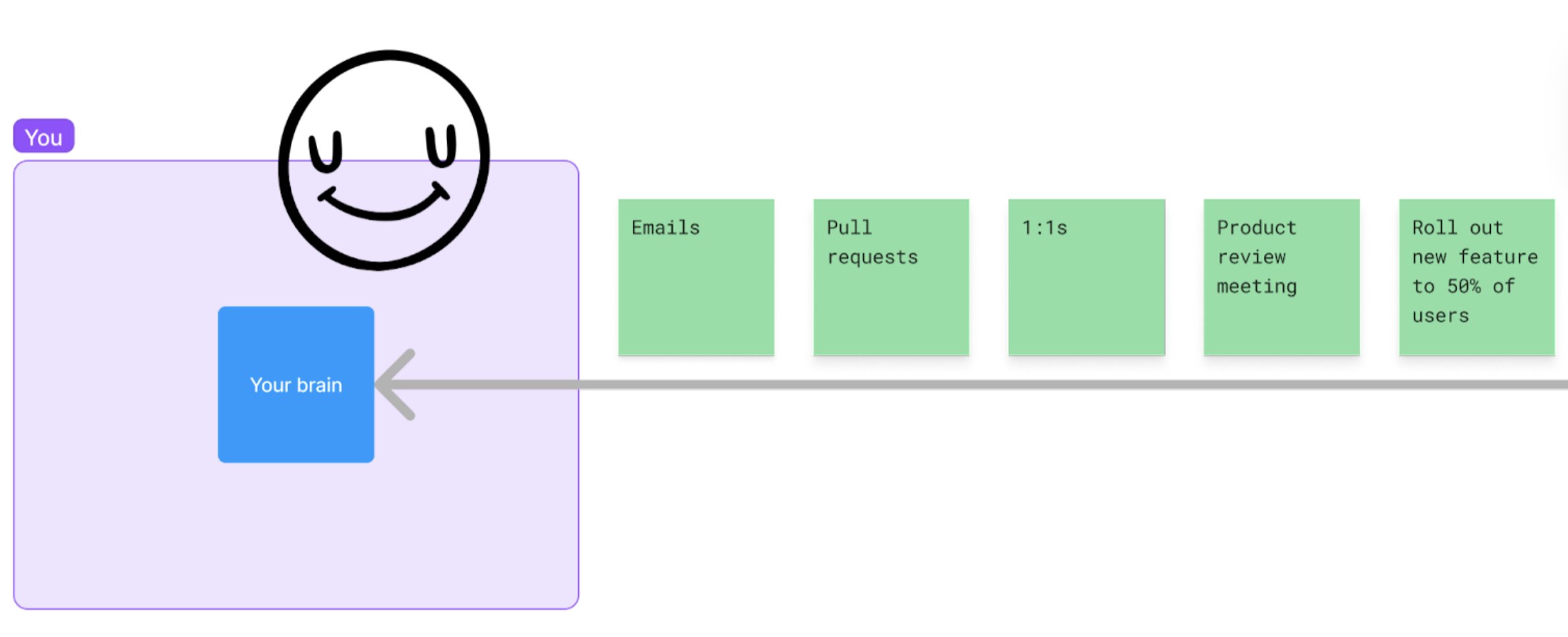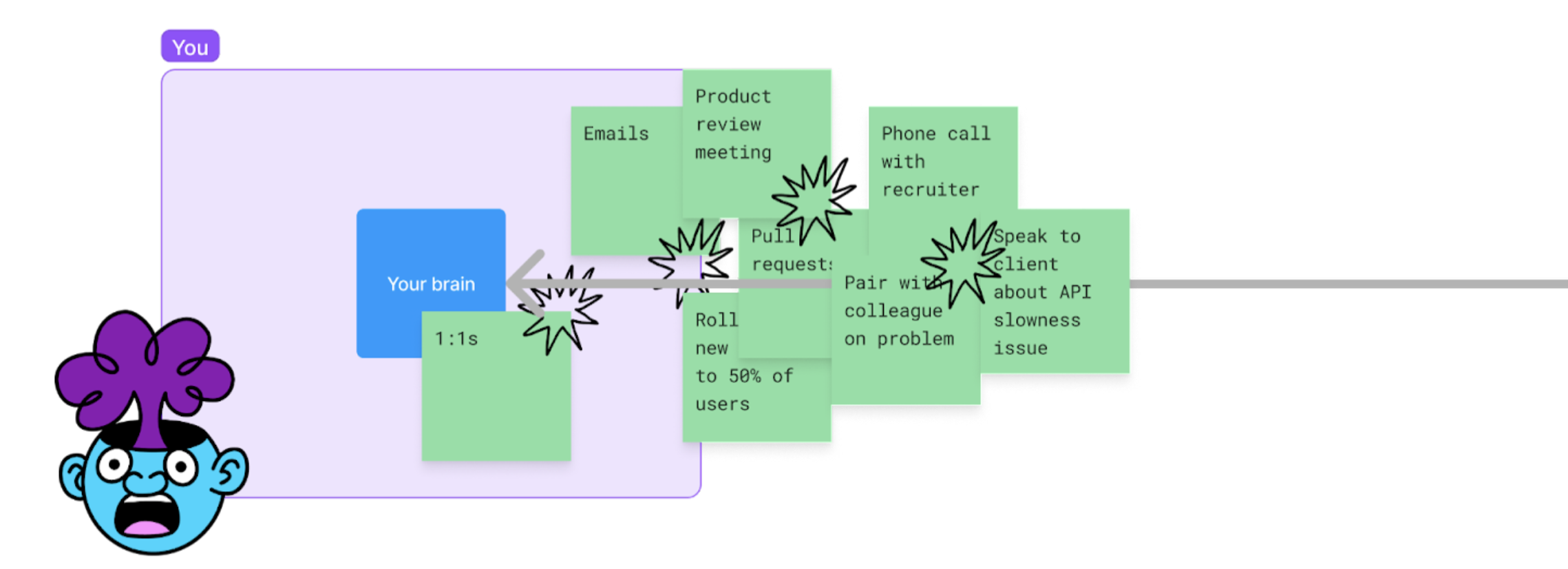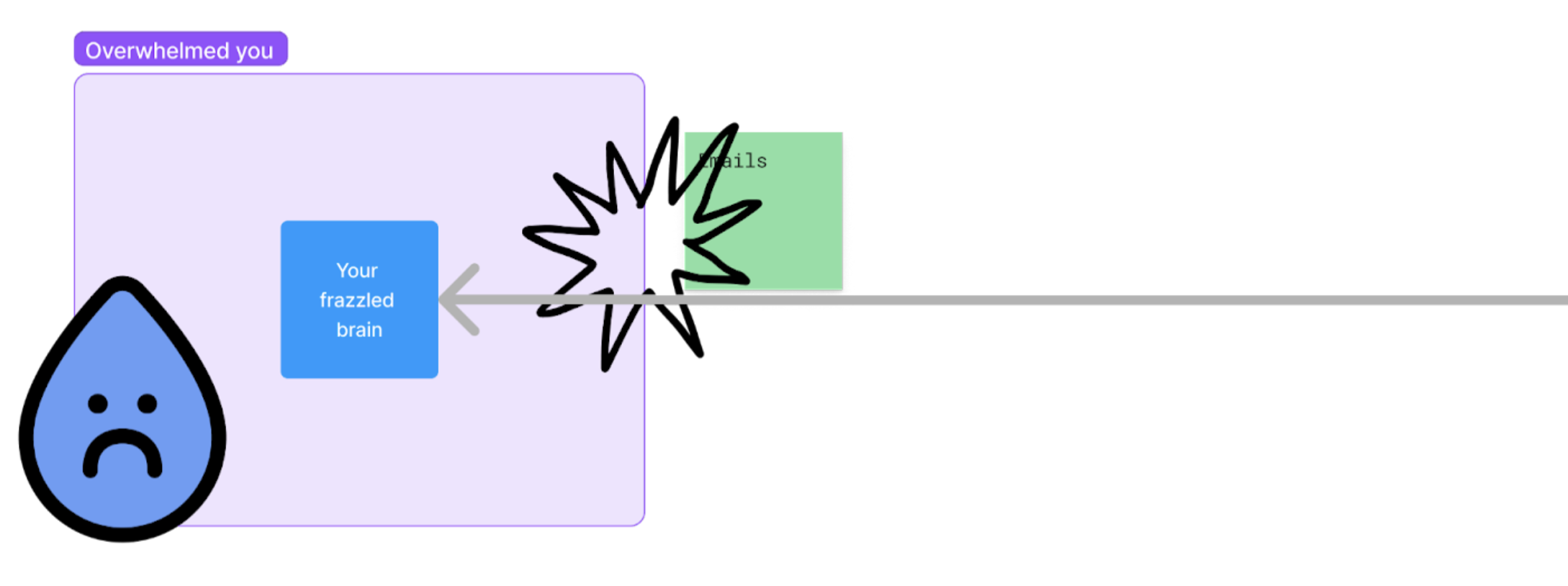You have 1 article left to read this month before you need to register a free LeadDev.com account.
Feeling overwhelmed isn’t as rare as we’d like to think. So, when these emotions do arise, it’s good to have some techniques that can help you overcome them.
Everyone gets overwhelmed.
It doesn’t matter how experienced you are, whether you are a manager or an individual contributor (IC), or whether you’ve gotten through the feeling a thousand times before, it will happen again. And again still.
The key is to be able to face the emotion with self-reflection and introspection so you can pull it apart, determine its cause, and then work out how to proceed from there. Sometimes the reason may surprise you.
What does being overwhelmed mean?
Before we look at some tools for addressing overwhelm, let’s define what it is.
Overwhelm: an emotional state that is felt when one cannot seemingly cope with the demands, emotions, or responsibilities that they are facing. This emotion can also manifest as stress, anxiety, or feelings of being out of control.
Thinking about this a little more like a software engineer, imagine yourself as a box that takes inputs and then computes them; either producing outputs or just no-op acknowledgments.

When you’re not in a state of being overwhelmed, you’re continually processing inputs, getting stuff done, and feeling pretty fine about it. However, when you’re in a state of being overwhelmed, the outsized emotional strain that those inputs put on you causes all of that processing to go wrong.
In other words, becoming overwhelmed turns good stress into bad stress.
Stress can be defined as the void created between our current situation and the expectation of where we need to be. Sometimes this stress can be good – i.e., eustress – as it generates momentum and excitement and gives us the push to move forward.
However, in a state of being overwhelmed the void between our current struggle to perform and our knowledge of just how good we could be causes bad stress – i.e., distress – which is an unsustainable place to be. It becomes a vicious cycle of self-loathing, preventing you from making any progress, and in the worst case, harming you.
External factors: Mechanical solutions
The simplest solution to driving down the possibility of becoming overwhelmed is getting that input queue under control. You want to make sure that you progress at a steady, sustainable, and predictable pace. Ideally, you should work on one thing at a time, ensuring that tasks are completed on schedule and in the right order.
In the absence of this organized system, becoming overwhelmed is inevitable. There’s just too much happening at once, causing you to spin in circles and make no progress.

Even the most hardened person has an upper limit on what they can do, especially in the face of an ever-growing input queue that is stuffed with ambiguous priority orders. Luckily, there are some straightforward tools you can use to address this.
- Step back. If you’re overwhelmed and spinning, get some distance from the current situation. If it helps, write everything down that you need to do rather than keeping it all in your head. Look at everything on your plate and prioritize in order of importance. Use a tool like the Eisenhower matrix to bring some clarity to seemingly overlapping and competing tasks. Scrutinize the importance and timeframe for everything you have to do.
- Delegate tasks to others on your team. If you’re a new leader, you may think that you have to lead from the front and do the most work out of everybody to set an example. The opposite is actually true: you should act as a load balancer to distribute tasks to your colleagues so that you can drive up the collective impact of your team. If you don’t manage others directly, then discuss how you can achieve greater efficiency on the team’s collective tasks with your colleagues or manager.
- Organize your time to prevent context-switching. We know that continuous context-switching between multiple tasks is bad for your efficiency: too many interruptions mean you can’t get the right focus to complete tasks, and, at worst, it can lead to thrashing, with nothing ever getting done.
This is a vicious cycle. Instead of falling into this pattern, try blocking out time in your calendar to dedicate your focus to just one task at a time. If you’re doing work for other people, make the task’s timeline clear to everyone involved. By doing this, you’ll decrease the likelihood of feeling overwhelmed and increase visibility on the task for the person you’ve been asked to complete it for. This will allow you to progress at a steady and comfortable pace. - Escalate whenever the workload becomes unmanageable. Sometimes, no matter what you do, you simply can’t do all of the work that is on your plate. If you’re being given five things to be done by tomorrow morning and it’s already 4 PM, you need to escalate. After all, this isn’t your fault: there’s just an unreasonable demand on your time. This could mean speaking to your manager or your stakeholders and explaining the situation. They’ll be able to guide you on which tasks can be completed now, and which can be left for another time. Maybe some work can be moved to another team, or maybe something can wait a few more days. When given options to choose from, stakeholders are usually far more reasonable than you originally thought they’d be.
So, if you’re feeling overwhelmed due to purely mechanical reasons, i.e., you just have too many inputs to reliably work through, there’s usually always an answer. But these feelings aren’t always caused by external factors; sometimes, your greatest enemy is yourself.
Internal factors: Emotional solutions
If you’re feeling good, but have too much work, there are straightforward solutions that can help you out like the ones we went through above.
However, what happens if feelings of being overwhelmed are coming from within?
Extended periods of hard work with no break, long hours, or emotionally challenging situations inside and outside of work can take their toll on your mental state, and the resulting feelings of being overwhelmed can make the smallest tasks seem impossible.
Even just answering an email.

This is where you need to be able to understand yourself.
Self-awareness is how you realize that you’ve gotten into a suboptimal state. You can’t operate hell-for-leather forever. It will wear you down. As a mental athlete, you need to understand that rest, as well as training, makes you improve over time, because an exhausted athlete cannot compete.
If you’re not good at catching when you’re becoming overwhelmed, then try an experiment where you write down a couple of sentences about how you’re feeling at the beginning of every day. If you don’t want to do that, you could even just write the date and use a color to signify how you feel. Look for patterns day-to-day, week-to-week, and month-to-month. You’ll gradually become better at associating with when you feel good, bad, or really, really ugly.
This is something that you get better at with time and experience. For those who are highly driven and motivated by achievement, it can be challenging to listen to your own emotions and step away from the vehicle for a while so that you can come back stronger another day. But, improving your self-awareness is how you develop an intuition that the feeling of being overwhelmed may be on the horizon.
With improved insight into your emotions, you can take action to get some distance and rest before a few “off days” develop into overload.
The different stresses: Choose wisely
When you introspect and start to notice feelings of being overwhelmed that should be your sign to press pause. Take some days off. Get away from the computer. Do something you enjoy that’s different from the physical and mental posture that’s generated this feeling. Talk to your team and manager; they’ll likely be more supportive than you think, especially if you feel embarrassed that you’re in this state.
Remember, it will pass. Rest and recharge are the difference between eustress or distress ruling your life. So make sure that you get it. And once you’ve recovered, you can look at your obstacles in a different light, and face them head-on.



